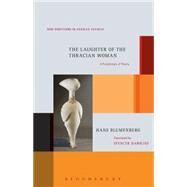- ISBN: 9781623564612 | 1623564611
- Cover: Hardcover
- Copyright: 4/23/2015
An important work by 20-century philosopher Hans Blumenberg, here translated into English for the first time, The Laughter of the Thracian Woman describes the reception history of an anecdote best known from Plato's Theaetetus dialogue: while focused on observing the stars, the early astronomer and proto-philosopher Thales of Miletus fails to see a well directly in his path and tumbles down. A Thracian servant girl laughs, amused that he sought to understand what was above him when he was not mindful of what was right in front of him.
Variants of this story recur in texts by Diogenes Laertius, Church Fathers Tertullian and Eusebius, medieval and Renaissance-era preachers, Enlightenment figures Voltaire, Montaigne, Bacon, and Kant, and later in works by Feuerbach, Nietzsche, Heidegger, and Blumenberg's own colleagues. Some of these philosophers sympathize with Thales' ambitions while others chastise his negligence. Blumenberg sees the story as a highly sought substitute for our missing knowledge of the earliest historical events that would fit the label “theory.” By retelling the anecdote, philosophers reveal their distinctive values regarding absorption in curiosity, philosophy's past, and the demand that theorists abide by sanctioned methods and procedures.
In this work and others, Blumenberg demonstrates that philosophers' most beloved images and anecdotes have become indispensable to philosophy as metaphors; that is, as representations whose meanings remain indefinite and invite frequent reinterpretation.







